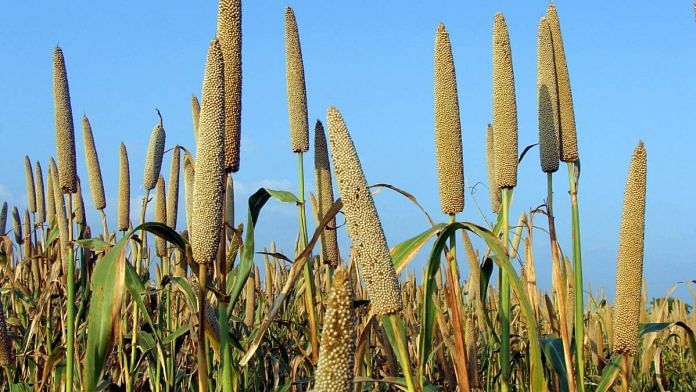Thank you dear subscribers, we are overwhelmed with your response.
Your Turn is a unique section from ThePrint featuring points of view from its subscribers. If you are a subscriber, have a point of view, please send it to us. If not, do subscribe here: https://theprint.in/subscribe/
The year 2023 has been designated as the International Year of Millets (IYM2023) by the Food and Agriculture Organization (FAO) and the United Nations. The significance of millets for consumer health, sustainable livelihoods of farmers, income diversification, and the development of climate-resilient agricultural systems was emphasized during a recent gathering of G20 Agriculture Ministers.
Millets, a group of small-seeded grasses primarily cultivated in arid regions of Asia and Africa, are classified as major and minor millets based on their grain size and the extent of cultivation. Some key millet crops include sorghum (jowar), pearl millet (bajra), finger millet (ragi/mandua), foxtail millet (kangni/Italian millet), little millet (kutki), kodo millet, barnyard millet, proso millet (cheena/common millet), and brown top millet (korale).
Millets, often referred to as superfoods or nutri-cereals, possess high nutritional value and offer numerous health benefits. They are abundant sources of dietary fiber, plant-based protein, essential minerals, vitamins, and antioxidants. This makes millets an excellent choice for balanced nutrition in countries like India, which are grappling with triple burden of malnutrition caused by undernutrition, overnutrition, and micronutrient deficiencies. India ranks 107 out of 121 countries on the Global Hunger Index 2022, and the Global Nutrition Report 2022 indicates that India has made some progress on few indicators but there are many areas which require significant improvement.
Additionally, millets are gluten-free and have a low glycemic index, making them beneficial for managing diseases like diabetes and promoting better blood sugar control.
Agriculture is one of key contributors to climate change due to excessive chemical use, soil degradation, deforestation and groundwater consumption. This emphasizes the need for sustainable and climate smart agriculture practices, in which millets play a crucial role. They are well-known for their resilience to diverse climatic conditions, particularly in dry and hot regions with limited rainfall. They require less water for cultivation, thereby reducing reliance on depleting groundwater reserves. By incorporating millets into cropping systems, soil fertility can be improved through enhanced soil organic matter, while their extensive root systems provide protection against soil erosion and land degradation.
In comparison to other cereals like wheat and rice, millets require fewer inputs due to their shorter growth cycles, reduced need for irrigation and relative resistance to pests and diseases. This reduces the necessity for chemical pesticides and fertilizers, benefiting the environment by reducing the environmental load and benefiting farmers due to lower expenses and quicker revenue generation. Consequently, millets present an attractive option for organic and sustainable farming systems, promoting self-sufficiency and reducing reliance on imported cereals.
The International Year of Millets serves as an excellent platform to raise awareness of their health benefits, their role in sustainable agriculture due to their resilience under adverse and changing climatic conditions, and their importance in the economic growth of smallholding farmers.
These pieces are being published as they have been received – they have not been edited/fact-checked by ThePrint.

